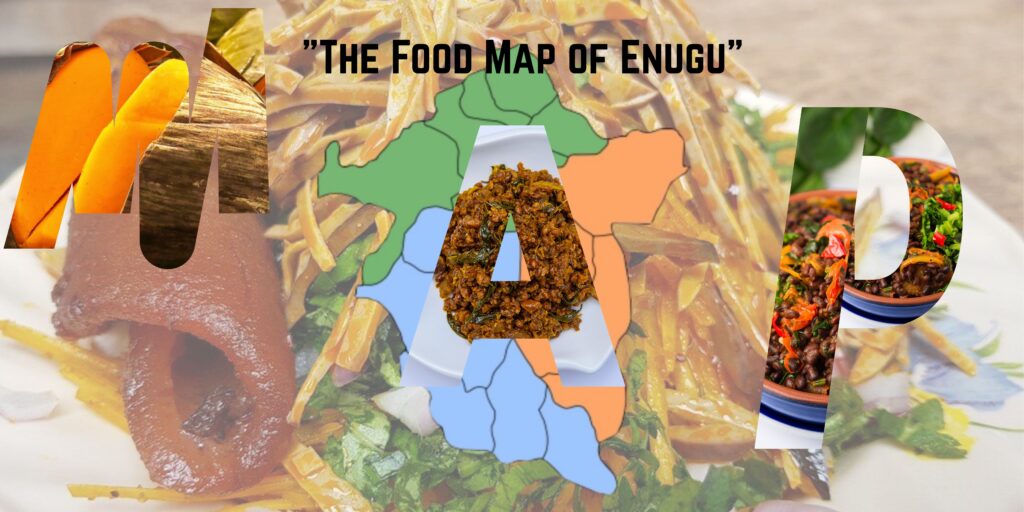When you think of Enugu, you might first imagine the beautiful hills and the friendly people. But one thing that stands out even more is the food. Enugu is blessed with many rich, tasty local dishes that not only fill the stomach but also tell the story of the people. Every meal you find here has a history, a reason why it was created, and why it is loved by many today.
In this blog, we will explore how some of the popular foods in Enugu started, why they are special, and how they have remained important over the years.
Understanding the People of Enugu
Before we dive into the foods, it is important to know a little about the people. Enugu is mainly occupied by the Igbo people, one of the largest ethnic groups in Nigeria. The Igbos are hardworking, creative, and very proud of their culture. Food is a big part of their tradition. For them, eating together brings families closer, and many celebrations are never complete without delicious meals.
The natural environment of Enugu also plays a big role. With good soil and plenty of rain, farming is easy. This means that people have access to fresh vegetables, tubers, fruits, and other farm products all year round. These natural gifts helped shape the foods that Enugu people eat today.
Now, let us look at some of the famous foods and how they came to be.
1. Okpa: The King of Enugu Snacks
If you have ever traveled to Enugu, you must have heard hawkers shouting “Okpa di oku!” (meaning “Okpa is hot!”) on the streets. Okpa is a popular snack made from Bambara nut flour.
Origin:
Okpa is believed to have started in the rural villages of Enugu, especially in places like Udi and Ngwo. The Bambara nuts used for okpa were easy to grow in the region. Women discovered that when you grind the nuts into fine flour, mix it with water, palm oil, and seasoning, and then steam it, it becomes a delicious and filling meal.
Why it became popular:
Okpa is very rich in protein and energy, making it perfect for workers, travelers, and farmers who needed strength to go about their day. Its easy preparation and long shelf life made it spread quickly across towns and cities.
Today, okpa is more than just food. It is a symbol of Enugu pride.
2. Abacha: The African Salad
Abacha is another special dish made mainly from dried shredded cassava.
Origin:
In the olden days, cassava was a major crop in Enugu because it grew fast and well. But because fresh cassava does not last long after harvest, the people found ways to preserve it. One method was to slice, dry, and store it, leading to the creation of Abacha.
How it is made:
When ready to eat, the dried cassava is soaked in water, then mixed with palm oil, ugba (oil bean seeds), onions, pepper, garden eggs, and sometimes fish or kpomo (cow skin). A special seasoning made with potash gives it a unique taste.
Why it is loved:
Abacha is usually eaten cold, making it perfect for the hot weather in Enugu. It is also a favorite food for gatherings and celebrations.
3. Nsala Soup: White Soup
Nsala, also called white soup because it is not colored with palm oil, is another delicious dish common in Enugu.
Origin:
This soup has its roots in the northern part of Igbo land, including parts of Enugu. Long ago, hunters and fishermen who lived near rivers needed a simple soup they could quickly cook with fresh fish or bush meat.
How it is made:
Nsala soup is mainly cooked with catfish or goat meat, thickened with yam, and spiced with local seasonings like uziza seeds. It is often eaten with pounded yam.
Why it is special:
Nsala soup has a light, tasty flavor and is often reserved for special guests or nursing mothers because it is considered very nourishing.
4. Ofe Akwu: Palm Nut Stew
Ofe Akwu is a rich stew made from palm nuts. It can be eaten with rice or used to enjoy swallow foods like fufu.
Origin:
Palm trees are everywhere in Enugu. In fact, palm oil was once called “red gold” because of its importance. To avoid wasting any part of the palm nut, the people created Ofe Akwu.
How it is made:
Palm nuts are boiled and pounded to get thick oil, which is then cooked with meats, fish, spices, and sometimes vegetables like scent leaves (nchuanwu).
Importance:
Ofe Akwu shows the people’s wisdom in using natural resources fully. It is loved for its deep flavor and rich texture.
5. Achicha: Dried Cocoyam Meal
Achicha is another traditional Enugu food, made from dried cocoyam and often mixed with beans and oil.
Origin:
In the past, cocoyam was a food security crop. Farmers dried and stored it for use during dry seasons when food was scarce. Achicha was a way to ensure there was always something to eat.
Preparation:
The dried cocoyam is soaked overnight, steamed, and mixed with cooked beans, palm oil, onions, and pepper.
Why it is valued:
Achicha is not just food; it represents survival, patience, and wise preparation for hard times.
6. Yam: The Pride of Igbo Land
Yam holds a special place in Enugu and Igbo culture at large. It is often called the “king of crops.”
Origin:
Yam cultivation goes far back in history. Every year, the New Yam Festival is celebrated to thank the gods for a good harvest.
Popular Yam Meals:
- Ji Agworagwo: Boiled yam and spicy pepper sauce.
- Yam porridge (Asaro): Yam cooked with palm oil, vegetables, and spices.
- Roasted Yam and Palm Oil: Simple but deeply traditional.
Importance:
Yam symbolizes wealth, strength, and prosperity among the Igbo people.
7. Other Special Foods
Aside from the ones mentioned, Enugu has many other mouthwatering foods like
- Ukwa (Breadfruit porridge): Made from the nutritious ukwa seeds, cooked with palm oil, pepper, and sometimes fish.
- Pepper Soup: A spicy broth usually made with goat meat or fish, perfect for relaxation.
- Nkwobi: A spicy cow foot dish, often enjoyed with cold drinks at social events.
Each of these foods has its own special story linked to survival, creativity, and celebration.
How Modern Times Are Changing Enugu Food
Today, even with modernization, the people of Enugu still hold their food traditions dearly. However, there are new influences too:
- Many young people are learning to cook these meals faster, using modern kitchen tools.
- Restaurants are adding new styles and flavors to traditional dishes.
- Packaged versions of okpa flour and abacha can now be found in supermarkets, making it easier for people to prepare them anywhere.
Despite these changes, the heart and soul of Enugu food remain the same: natural, rich, tasty, and full of history.
Final Thoughts
The foods of Enugu are more than just meals. They are stories passed down from grandmothers to mothers to children. They are proofs of the creativity of the Enugu people and how they turned their natural environment into delicious meals that have lasted for generations.
Next time you eat a wrap of okpa, a bowl of abacha, or a spoonful of nsala soup, remember that you are not just eating food. You are tasting history, culture, and the spirit of a people who know how to make the best out of what they have.
Enugu food is a gift to Nigeria and the world, and it deserves to be celebrated always.

